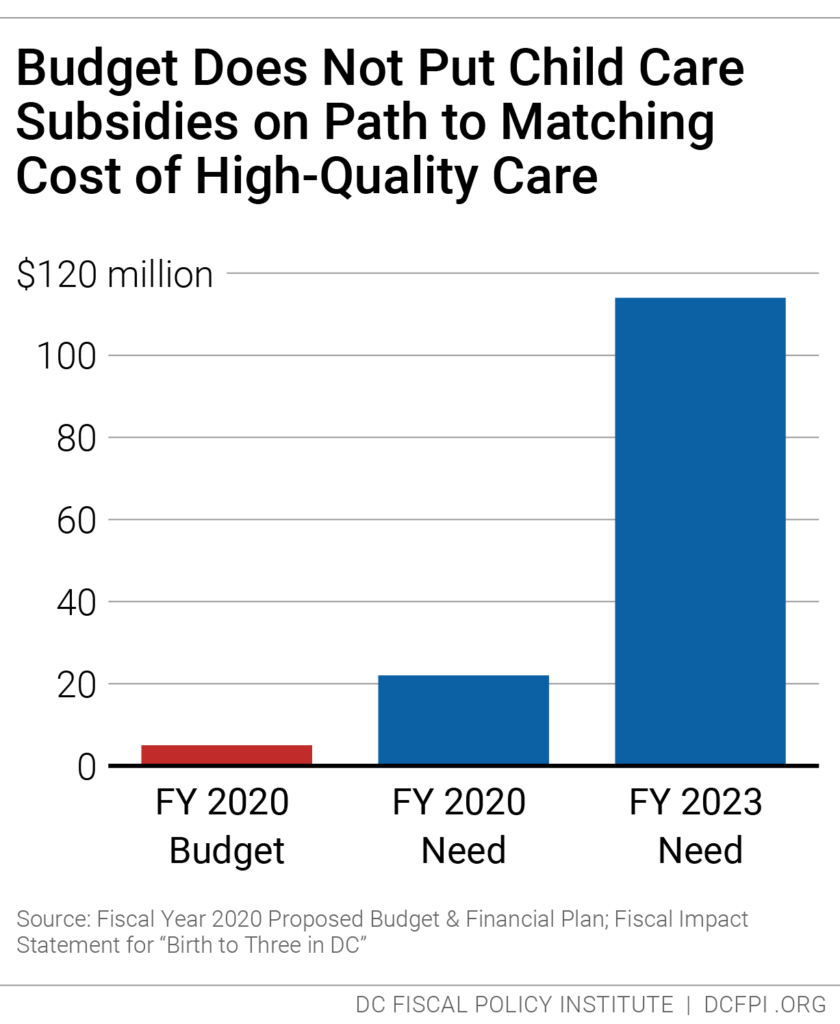Chairman Grosso, Chairman Mendelson, and other members of the Council, thank you for the opportunity to testify today. My name is Ed Lazere, and I am the Executive Director of the DC Fiscal Policy Institute. DCFPI is a non-profit organization that promotes budget choices to address DC’s economic and racial inequities and to build widespread prosperity in the District of Columbia, through independent research and policy recommendations.
I’m here today to address DC’s early childhood education programs in the FY 2020 budget and express DCFPI’s support for fully funding increases in the child care subsidy program called for under the “Birth to Three for All DC” Act (Birth to Three). The proposed budget includes $5 million more for the subsidy program, but this is less than one-fourth of the $22 million needed to put DC on a path toward providing high-quality care to all infants and toddlers in low-income families. We encourage the Council to find additional resources to support this and other provisions of Birth to Three.
The period from birth to age three is critical for social, emotional and cognitive development—it’s the foundation on which all future learning rests. Over this time, babies’ brains grow to 85 percent of their adult size, creating more than a million neurons every second.[1] This time of growth is unmatched during any other period in life. Yet too many children in families with low incomes and children of color face barriers to academic achievement beginning at birth. Research shows that children in low-income families “often receive early care of such poor quality that it diminishes their potential” but that investments to improve the quality of care they receive has “positive effects that can endure into the early adult years.”[2]
We applaud the Council’s leadership on this issue, with the development and passage of the Birth to Three for All DC Act last year. This groundbreaking and comprehensive legislation will transform the system of supports for young children and help ensure that every DC child gets off to the right start from birth. The goals of the legislation are to improve school readiness, improve the quality of early education, offer competitive compensation for early educators, make child care more affordable to all DC families, expand home visiting, and strengthen social-emotional health and coordinated medical services for young children and families.
Improving early education is a key to the success of the Birth to Three Act. Access to high-quality, affordable early learning can reduce the difference in school readiness between low-income toddlers and their higher-income peers. Children who receive quality care also grow up to earn more money as adults.[3]
Yet DC’s support of early education is not enough to cover the costs of high-quality early care and education.[4] This leaves many providers struggling to make ends meet and contributes to a shortage of high-quality care. It also leaves compensation for teachers and staff at very low levels—an average of $29,000—making it hard to attract and retain an experienced workforce.
This is particularly a problem for providers in low-income neighborhoods that primarily serve children who are in the subsidy program. Nearly all licensed infant and toddler slots in Wards 7 and 8 are used by children receiving subsidies, and over half of the children in licensed child care in Wards 1, 4, and 5 are receiving subsidies.[5]
The Birth to Three Act calls for raising child care subsidies by 2023 to cover the full cost of care and to raise compensation of early educators to align with salaries of public school teachers. This will ensure that all providers have the resources needed to provide high-quality care and that salaries for early educators are sufficient to compete with K-12 schools to attract and retain a skilled workforce.
The proposed DC budget includes $5 million to improve DC’s child care subsidy program, building on increases in FY 2018 and FY 2019. Yet the new increase is less than one-fourth of the $22 million increase needed in FY 2020, and less than 5 percent of the $114 million needed over the next four years.
DCFPI urges the DC Council to find the resources needed to move forward with implementation of the Birth to Three Act, by adding $17 million more for the child care subsidy program.
Thank you for the chance to testify.
[1] Center on the Developing Child at Harvard University. “Five Numbers to Remember about Early Childhood Development.” 2009.
[2] See Zero to Three, “Infant-Toddler Child Care Fact Sheet” 2017.
[3] Heckman, James, “Lifecycle Benefits”
[4] See, for example, Modeling the Cost of Child Care in the District of Columbia, 2018, Office of State Superintendent of Education. The report concludes (page 5) that “In most cases, a provider’s estimated cost of delivering early care and education services exceeded the revenue generally available to provide care at different levels of quality.”
[5] One hundred percent of licensed infant and toddler slots in Wards 7 and 8 and over 50 percent in Wards 1,4, and 5 are used by children receiving subsidy. Office of the State Superintendent. (2018). Question 18, Fiscal Year 2018 Performance Oversight Hearing Responses. Retrieved from the Committee on Education 2018 Dropbox.

